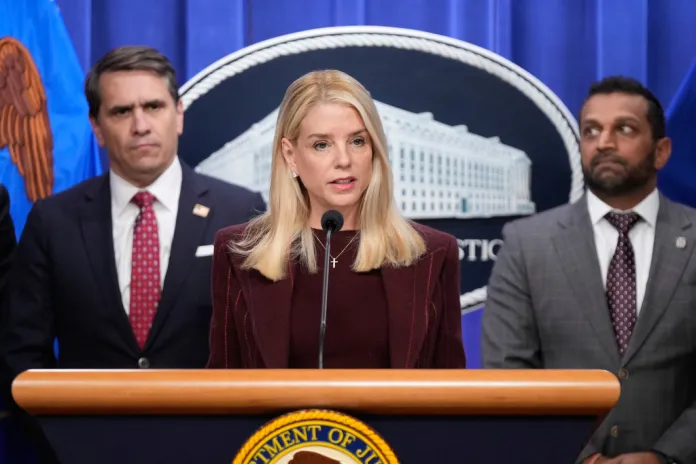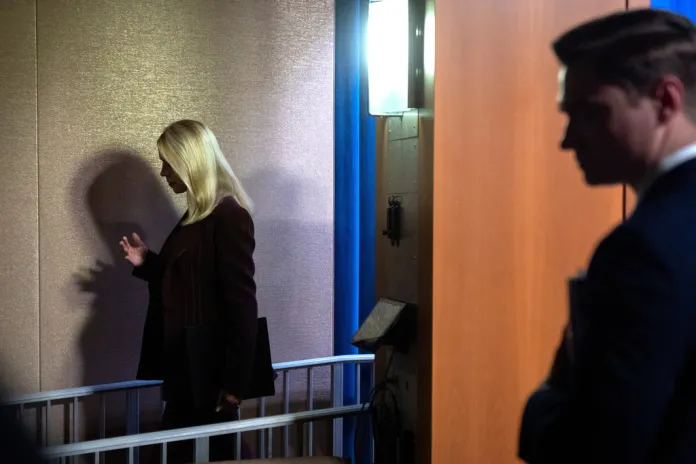The Justice Department will release additional files from its investigation into the late sex offender Jeffrey Epstein within 30 days, Attorney General Pam Bondi said Wednesday, while signaling that an active federal inquiry in New York and the need to shield victims could mean the public never sees a complete record.
Bondi, speaking at a news conference on Wednesday morning, repeatedly dodged questions about whether every remaining document would be released under new legislation Congress sent to President Donald Trump this week. Instead, she stressed that the department has already sent “over 33,000” Epstein records to Capitol Hill and would “continue to follow the law with maximum transparency” while protecting sex-trafficking victims.

“We will continue to follow the law and to have maximum transparency,” Bondi said. “Also, we will always encourage all victims to come forward.”
Pressed on whether the DOJ would provide all of the files within the 30-day window contemplated by Congress, Bondi would only repeat that “the law passed both chambers last evening, it has not yet been signed, but we will continue to follow the law again while protecting victims, but also providing maximum transparency.”
🚨MAJOR: AG Pam Bondi now says there is “new information, additional information” on Epstein, directly contradicting DOJ’s claim that no further investigation was needed.
— Brian Allen (@allenanalysis) November 19, 2025
The goalposts are moving. Someone’s protecting someone. pic.twitter.com/6DdL4PTPLQ
Her careful wording lays bare the gap between the political rhetoric around the Epstein records and the legal reality. The bill that cleared the Republican-controlled House and Senate nearly unanimously orders the attorney general to release all unclassified information related to the investigation, but it also builds in wide carve-outs that the department can invoke to keep material secret.
Among those exceptions is a provision allowing the Justice Department to withhold records if their disclosure “would jeopardize an active federal investigation or ongoing prosecution.” Another allows officials to refuse to release anything that would be a “clearly unwarranted invasion of personal privacy” or that “depicts or contains child sexual abuse,” language that dovetails with the department’s long-standing arguments about graphic victim material and sensitive personal details embedded throughout the file.
The DOJ now appears to have locked itself into precisely the kind of conflict the new law contemplates. And under Section 1-7.400 of the Justice Manual, officials are already prohibited from releasing any information that could “reasonably be expected to interfere with enforcement proceedings,” a standard that broadly covers materials tied to active investigations.
On Friday, Trump ordered Bondi to launch a fresh federal investigation focused on Epstein’s past ties to prominent Democrats, including former President Bill Clinton, megadonor Reid Hoffman, and former Treasury Secretary and Harvard president Lawrence Summers. Bondi responded by requesting that acting U.S. Attorney Jay Clayton of the Southern District of New York run the investigation out of one of the most powerful federal prosecutor’s offices in the country.
In a post on X announcing the move, Bondi praised Clayton as “one of the most capable and trusted prosecutors in the country” and vowed the department would “pursue this with urgency and integrity to deliver answers to the American people.”
Thank you, Mr. President. SDNY U.S. Attorney Jay Clayton is one of the most capable and trusted prosecutors in the country, and I’ve asked him to take the lead. As with all matters, the Department will pursue this with urgency and integrity to deliver answers to the American… pic.twitter.com/5zlybVu44U
— Attorney General Pamela Bondi (@AGPamBondi) November 14, 2025
At Wednesday’s news conference, Bondi cited that open SDNY investigation as the reason she could not describe what “new information” prompted the reversal from the DOJ’s position this summer, when officials said they saw no basis to pursue additional “uncharged third parties” and would not be releasing the bulk of the Epstein case file.
“There is new information, additional information, and, again, we will continue to follow the law to investigate any leads,” Bondi said, declining to elaborate when a reporter asked whether the department was now seeking material from the Epstein estate that was not available when Deputy Attorney General Todd Blanche in late July interviewed Ghislaine Maxwell, Epstein’s former girlfriend who was convicted in 2021 on five counts related to sex trafficking.
“I would refer to the Deputy Attorney General’s post that he put out on X, and we’re not going to say anything else on that, because now it is a pending investigation in the Southern District of New York,” Bondi said.
Blanche’s social media post that Bondi referenced came in response to anti-Trump lawyer George Conway, who had accused him of either botching or soft-pedaling his earlier questioning of Maxwell in a way that avoided implicating Trump. Blanche fired back that when he interviewed Maxwell, “law enforcement didn’t have the materials Epstein’s estate hid for years and only just provided to Congress,” suggesting critics did not understand how such interviews work.
George, you’ve never been confused for a trial lawyer, and these kinds of posts explain why. When I interviewed Maxwell, law enforcement didn’t have the materials Epstein’s estate hid for years and only just provided to Congress. Stop talking. It’s unbecoming. https://t.co/g8j3oe1pCT
— Todd Blanche (@DAGToddBlanche) November 13, 2025
Those newly surfaced estate materials, which included thousands of pages of emails and records that the House Oversight Committee released last week, helped reignite questions about Trump’s past relationship with Epstein, including messages in which Epstein told associates that “of course” Trump knew about his behavior with underage girls and spent hours at his home. Trump has denied any wrongdoing and said he had a falling-out with Epstein in the mid-2000s, something the new materials did not appear to contradict.
Republicans and the administration criticized Democrats for acting in bad faith with their handling of the estate files, including by making unnecessary redactions in some of Epstein’s emails and blurring out the name of Epstein victim Virginia Giuffre, who died earlier this year but previously said Trump “didn’t partake in sex with any of us…”
So, to review:
— Wall Street Mav (@WallStreetMav) November 13, 2025
Democrats redacted a victim’s name from a batch of emails related to Jeffrey Epstein that mention Donald Trump to make it look like Trump had victimized the girl behind the redaction.
Then we find out the name they redacted was one of the victims who came out… pic.twitter.com/kLWMJnXsD2
The intense public interest in Epstein’s life and Trump’s early ties to him have left the president trying to walk a political tightrope. On one hand, Trump has maintained there is no smoking gun or revelation about his long-abandoned relationship with Epstein in the records that would be damning to him. On the other hand, any out-of-context email or reference to his name has spurred online critics into a frenzy.
For months, Trump resisted calls within his own party to force broad disclosure of the Epstein file. In July, during what has since been considered one of the biggest unforced errors on this subject matter, the DOJ and FBI circulated a two-page memo telling lawmakers that a “systematic review” of the Epstein materials had turned up no basis to charge additional individuals and that most of the file would remain under wraps. That stance became increasingly untenable as more and more Republican lawmakers demanded full transparency and questioned whether the DOJ was protecting the powerful. After the House Oversight Committee released its tranche of estate emails last week, pressure reached a fever pitch.
On Friday, Trump tried to turn the tables by ordering Bondi’s new SDNY investigation, casting it as a way to expose what he called an “Epstein Hoax” aimed at his White House and insisting that the financier was more deeply tied to Democrats. Two days later, after months of opposing disclosure, he abruptly urged House Republicans to vote for the Epstein records bill, writing that the chamber “can have whatever they are legally entitled to, I DON’T CARE!” He notably stopped short of explicitly endorsing public release of the entire file.

Bondi has now promised to release additional files within 30 days, once Trump signs the measure, starting a countdown that may end in disappointment for lawmakers on both sides. Beyond the new SDNY investigation, portions of the file are also expected to remain sealed under grand jury secrecy rules that the legislation does not explicitly waive.
And even if Congress believes Bondi overuses those carve-outs, its leverage is limited. The bill contains no enforcement mechanism. Lawmakers could attempt to revive an August subpoena that demanded the full Epstein file, but if the department refused, any criminal contempt referral would land back on Bondi’s desk for charging decisions against her own subordinates.
Some Republicans say they are betting political blowback will deter any perceived gamesmanship.
Sen. Rand Paul (R-KY) has argued that the lopsided House vote should send a clear message that “playing games” with redactions would backfire on the administration, according to the Washington Post. Democrats, by contrast, are openly skeptical that Trump’s late embrace of the bill signals a real change of heart.
“It would be naive of any of us to think that Trump has really had a conversion,” Sen. Peter Welch (D-VT) said this week, warning that Bondi could still point to the newly announced SDNY investigation as a justification for keeping documents under wraps.
Senate Minority Leader Chuck Schumer (D-NY) has huddled with colleagues on ways to keep pressure on the DOJ, vowing that Democrats will do “everything we can to make sure all of it comes to light and they don’t hide evidence against anyone who might be incriminated by these documents.”
TRUMP ASKS FBI TO INVESTIGATE EPSTEIN’S TIES TO TOP DEMOCRATS, INCLUDING BILL CLINTON
Meanwhile, Republicans on the House Oversight Committee are keeping their focus on helping Trump’s latest push to investigate records related to Epstein’s finances, including files held by institutions such as J.P. Morgan and Deutsche Bank. Chairman James Comer (R-KY) also wrote a letter to the U.S. Virgin Islands Attorney General Gordon Rhea on Tuesday, asking him for unredacted documents pertaining to the territory’s lawsuits against Epstein’s estate and J.P. Morgan by Dec. 2.
The Washington Examiner contacted representatives for Rhea’s office. DOJ representatives did not immediately respond when asked about logistics and expectations for releasing the next tranche of Epstein-related records.
